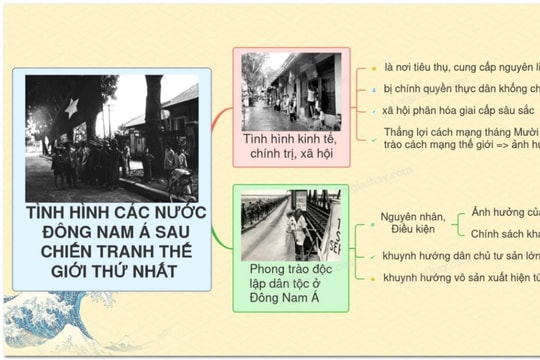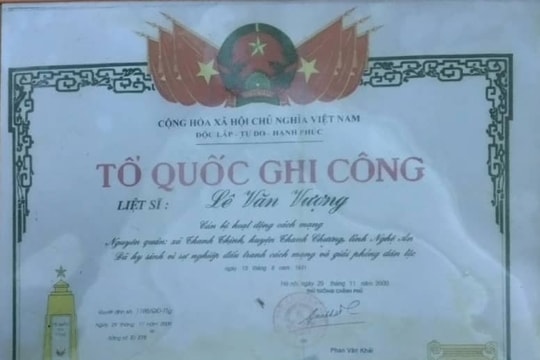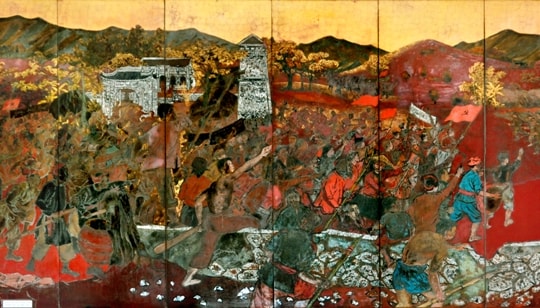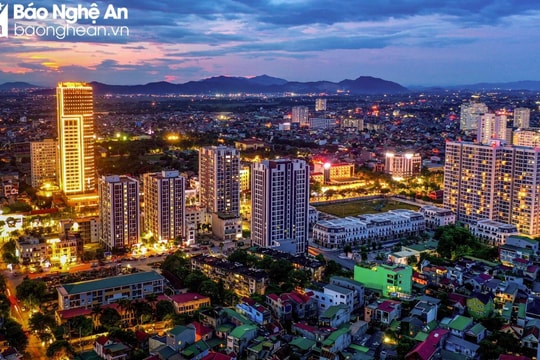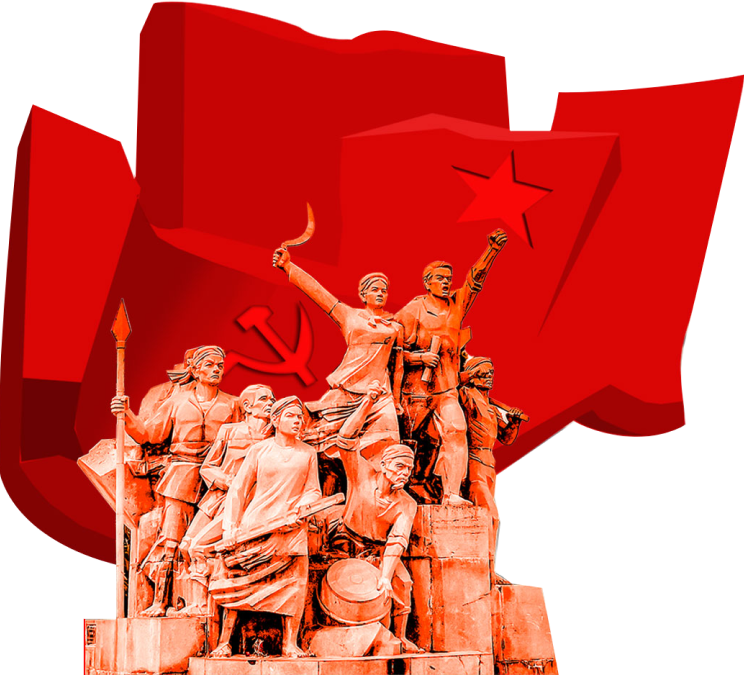Comrade Vo Trong An - a revolutionary path, a loyal heart
Comrade Vo Trong An is one of the key cadres in Hung Nguyen and Nghe An province.
“A man only dies once, if not first then later. Dying for the Party and the Fatherland is an honor. So many comrades have gone before! I am definitely not afraid.”(1) - That was the thought of the staunch communist soldier Vo Trong An when asked why he was able to overcome the harsh prison conditions at Vinh Prison and Kon Tum Prison where he was imprisoned and tortured three times.
Comrade Vo Trong An is a party member, veteran revolutionary, former Secretary of the Provincial Party Committee, Chairman of the Provisional Revolutionary Committee of Hung Nguyen district (1945), member of the Standing Committee of the Provincial Party Committee, Vice Chairman of the People's Committee of Nghe An province (1961).
Throughout his life of persistent and continuous revolutionary activities, both secretly and openly, in wartime and peacetime, Comrade Vo Trong An always showed himself to be a loyal, indomitable, exemplary cadre and party member who was not afraid of hardships and sacrifices, and devoted himself to serving the Party and the People. He was a shining example of implementing President Ho Chi Minh's teachings on "diligence, thrift, integrity, uprightness, impartiality, and selflessness".
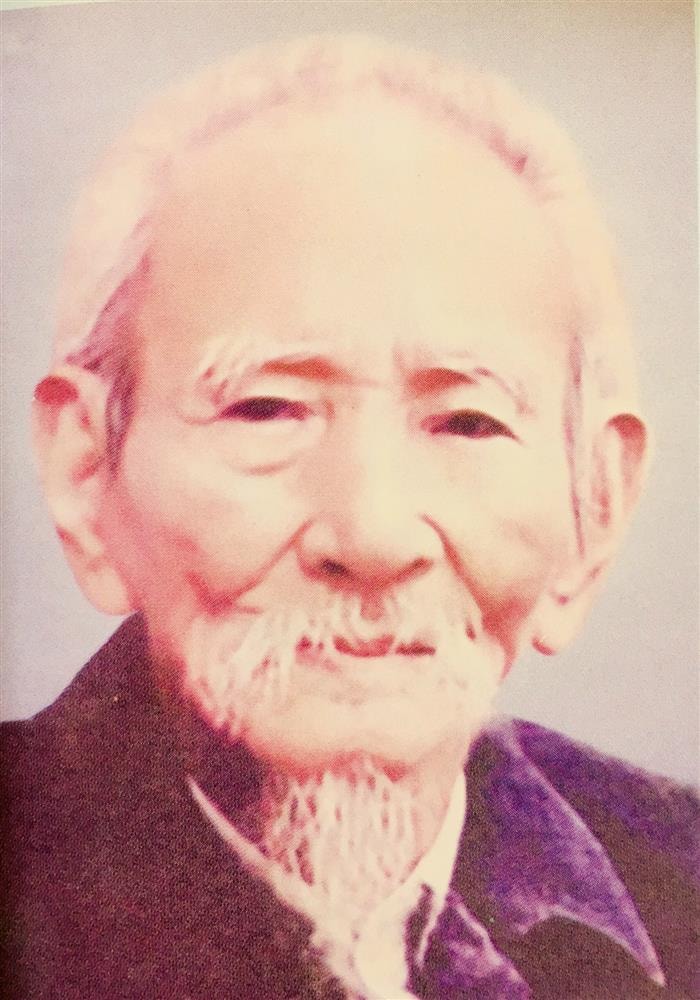
1. The guide for the Red seeds of the Vietnamese revolution
Comrade Vo Trong An (alias Nho Thach, Giap) was born in 1899 into a family with a tradition of patriotism and studiousness in Phu Xa village, Phu Long commune (now Hung Xa commune, Hung Nguyen district, Nghe An province).
His father was Vo Trong Ich and his mother was Le Thi Tuong. They always taught their children to love their country and their people. Vo Trong An's grandfather, Vo Trong Ai, was the eldest son of Vo Trong Can (often called Tu Lang because Can was famous for cutting traditional Chinese medicine).
Although he passed the Chinese Bachelor's exam in Quy Dau year 1873, Vo Trong Ai did not become an official but stayed home to prescribe medicine to treat people, raise and educate his children to adulthood. Vo Trong Ai had a fourth brother, Vo Trong Vieng (Tac Vieng), who was a general in the Can Vuong movement in the late 19th century, who gathered more than 300 soldiers with Doc Thoai (from Phu Long) to control the Giang River area to help the poor people fight taxes.
In 1895, when the Can Vuong movement failed, the French colonialists captured Vo Trong Vieng and brought him back to his hometown, beheaded him, and hung his head on a bamboo pole at Vuc market in an attempt to intimidate the patriotic spirit of the masses. Vo Trong Vieng's son, Vo Trong Dai (Vo Trong An's uncle), was the one who went to Siam (Thailand) to work in 1914.
The patriotic tradition of his family, clan, and homeland contributed to fostering in the soul of young Vo Trong An the desire and ambition to fight like his uncles and brothers to overthrow the colonial and feudal regime, bringing a peaceful and happy life to the people.
After Vo Trong Dai went abroad to Siam, the Vo family temple (Chi Cu Tu Lang) became a meeting place for patriotic young people with the idea of going abroad. Here, Vo Trong An had the opportunity to meet and exchange views on saving the country with like-minded friends. From those meetings and discussions, the fire of struggle was ignited even more strongly in the heart of the patriotic young man Vo Trong An.
In 1918, Vo Trong Dai returned to his homeland and selected his intelligent and agile nephews Vo Trong An, Vo Trong Tan, Vo Trong Canh (his uncles) and Dinh Nho Boc to go to Siam for training to act as a liaison between Trai Cay and Phu Xa (Hung Nguyen). After a period of living and studying in Siam, the three Vo brothers returned to their homeland with the mission of guiding patriotic youths through Trai Cay for training. The first trip included comrades: Ho Tung Mau, Hoang Van Hoan, Dang Quynh Anh...
Not only leading the way, Vo Trong An and Vo Trong Canh also organized and mobilized brothers in the clan, young people in the region and localities in Ha Tinh... to go abroad. With a favorable location, a place separate from the village, surrounded by dense trees, and having an access to Lam River, when needed, they could escape to the other side safely, Tu Lang's church continued to become a meeting place, gathering patriotic young people. Here, one could go by raft downstream or upstream on Ngan Pho River, to Laos to easily cross to Siam.
In 1923, Vo Trong An mobilized and organized for comrade Le Manh Than, a fellow villager of Phu Xa, to go abroad with an identity card bearing the name Le Xuan Dao. From then on, Le Manh Than used the name Le Xuan Dao to operate and later became Secretary of Phu Xa Party Cell, first Secretary of Hung Nguyen Party Committee (in 1930), Head of the Central Region Party Committee's Finance Department, and member of the Nghe An Provincial Party Executive Committee (in 1931).
In early 1924, the two brothers Vo Trong An and Vo Trong Canh continued to cross forests and streams, organizing a group to safely go to Siam, including comrades Le Hong Phong, Le Thiet Hung, Pham Hong Thai... From Trai Cay, these comrades continued to Guangzhou and were directly taught by Nguyen Ai Quoc and became the Red seeds of the Vietnamese revolution. After this trip, comrade Vo Trong An also participated in guiding many other patriotic youths through Siam and China.
2. Unyielding and steadfast in imperial prison
After the Phuc Viet Association was established at Con Meo Mountain (Vinh - Ben Thuy) on July 14, 1925, the Association's members returned to their locality to establish a base of operations. At the Vo family temple, Mr. Tu Lang organized a meeting to establish a sub-group of the Phuc Viet Association, including comrades: Dang Thai Mai, Ton Quang Phiet, Ton Gia Chung, Vo Trong Tan, Vo Trong An, Vo Trong Canh, Le Xuan Dao...
In 1927, the secret police discovered documents in the church of Mr. Tu Lang and arrested Vo Trong Canh and sentenced him to 3 years in prison. Vo Trong An was also imprisoned in Vinh Prison for the crime of sending many young people abroad without permission from the government and participating in the Phuc Viet Association (later renamed the Tan Viet Party). In the harsh prison, the torture and harsh regime could not shake the will and spirit of the patriotic young man Vo Trong An. In early 1928, he was released from prison and began his life of activities, dedicating himself to the revolutionary movement of his homeland.
After the Communist Party of Vietnam was founded on February 3, 1930, grassroots Party organizations were established one after another. In May 1930, the Phu Xa village Party Cell was established with 8 comrades, including two brothers Vo Trong An and Vo Trong Canh, and two other comrades with the same surname Vo. Comrade Vo Trong Canh was assigned to be in charge of financial work, relief, donations, and borrowing rice from the rich to help the poor.
Comrades Vo Trong An, Vo Trong Canh, and Le Xuan Dao always stood side by side, as the "three-legged stool" in the campaigns to establish the Party before 1930 as well as in the People's struggle movement in the southwestern communes of Hung Nguyen district in 1930-1931.
In late 1930 and early 1931, Nghe Tinh experienced drought and crop failure, making the lives of the people, who were already subject to high taxes, even more miserable. Ton That Dinh, the district governor of Hung Nguyen, colluded with the governor of Nghe An, Nguyen Khoa Ky, to send troops to suppress the revolutionary movement in Hung Nguyen. By October 1930, they had set up a system of 14 military posts in the district and declared that Vo Trong An, Le Xuan Dao, Vo Trong Tan, and Vo Trong Canh were extremely dangerous elements, and that anyone who captured them would receive a generous reward.
In 1931, under the persecution of the colonial and feudal government, after comrade Vo Trong Canh sacrificed his life, comrade Vo Trong An also fell into the enemy's hands for the second time. Vo Trong An was sentenced to 3 years in prison and 2 years of house arrest (according to verdict No. 83 dated August 10, 1931)(2). Knowing that he was the guide for many patriotic youths to go abroad to Thailand, a key cadre in the Phu Xa Party cell, and a close friend of the Party Secretary Le Xuan Dao... they tried their best to torture and mistreat the communist soldier Vo Trong An.
Despite being on the brink of life and death many times amidst the enemy's beatings, he always maintained his integrity and undying faith in the Party's leadership. Vo Trong An turned the prison into a revolutionary school, a place to train the will and mettle of communists. He actively participated in the struggle and study activities in Vinh Prison.
In 1934, Vo Trong An was released. Returning to his hometown, he secretly contacted and connected with Party organizations. By early 1935, Vo Trong An had contacted comrades: Le Dinh Vi (Provincial Party Committee member), Chu Huy Man, Vo Van Nhuong (Nghi Loc) and actively worked to restore the Hung Nguyen Party Committee. He organized a combined Party cell operating in Phu Long Commune, Thong Lang.
Taking advantage of the Goda Delegation, the representative of the French government, who came to Indochina to survey and learn about the situation, Vo Trong An and a number of comrades organized to collect the aspirations of the masses to give to the delegation for investigation... Thanks to those active activities, the people of the communes in Hung Nguyen such as Yen Truong, Phu Long, Phu Xa, Duong Xa, Long Cu, Yen Thai... participated in demonstrations, welcoming and bringing people's aspirations in the Vinh market area and Diec pagoda very enthusiastically.
Comrades Vo Trong An and Chu Huy Man became key Party cadres in Hung Nguyen, contributing to the rebuilding of Phu Xa Party Cell in 1937 and Phuc My Party Cell in 1938 with dozens of Party members in the entire district. Although the official Provincial Party Committee had not yet been established, comrades Vo Trong An and Chu Huy Man, under the leadership of the Provincial Party Committee, led the struggle movement of the Hung Nguyen people as a Party Committee.
Along with supporting grassroots party organizations in the entire district, Vo Trong An and his comrades in Phu Xa Party cell quickly established legal and semi-legal mass organizations such as: Advanced Youth, Plowing Association, House Roofing Association, Book and Newspaper Reading Association, Folk Song Team, etc.
In 1940, comrade Vo Trong An was arrested for the third time and imprisoned in Vinh Prison. In order to destroy the staunch communist, they sentenced him to life imprisonment and exiled him to Kon Tum Prison.
This is Vo Trong An's memoir during his time in Kon Tum prison:“…I was sentenced to hard labor so I had to do hard labor: chopping trees, digging the ground, breaking rocks until my hands bled; eating and drinking poorly - moldy rice, dried fish with maggots, drinking water; suffering from all kinds of diseases besides scabies, malaria and dysentery. I was shivering with fever but still had to go to the construction site to dig the ground, chop trees, and carry rocks. When I was slow, they beat me on the neck and head, some of them bled profusely. Many comrades were exhausted, they beat me to death right at the workplace. Many died of dysentery and malaria. One person with dysentery infected the whole camp with tuberculosis. We had experience using baked sweet potatoes to feed people with dysentery, which helped. When we came home from work and passed through the village, the villagers often gave us a few sweet potatoes, which we saved to make medicine. During breaks, we lit a fire to roast them for the sick to eat as a form of nutrition and priority treatment…”3).
At Kon Tum Prison, Vo Trong An also met comrades who were key Party cadres such as To Huu, Chu Huy Man, Nguyen Duy Trinh... Comrade To Huu's poems became a source of encouragement for comrade Vo Trong An and his fellow political prisoners to have more strength to overcome the harsh years in prison. Despite being tortured and tormented by many different means and feeling a deep longing for his family... but comrade Vo Trong An with the will and courage of a communist who had been arrested and imprisoned many times in imperialist prisons overcame everything with the belief in the day of freedom to return to his homeland to continue to contribute his strength and intelligence to the revolutionary cause of the Party and the People.
On the occasion of the Japanese coup against the French on March 9, 1945, communist party members simultaneously fought to reduce sentences and release political prisoners. At Kon Tum Prison, many comrades were released, including Vo Trong An, Nguyen Quang, Ngo Mau...
3. Exemplary Party member, leader who wholeheartedly serves the Party and the People
Returning to his hometown, comrade Vo Trong An contributed to the revolutionary movement of his district to take a new step forward. Viet Minh Hung Nguyen under the direction of Vo Trong An, Vo Trong Cu (son of comrade Vo Trong Canh, called Vo Trong An uncle) and other comrades led the masses to prepare in all aspects to take power into the hands of the people.
After the success of the demonstration with the participation of over 2,000 people organized by the Hung Nguyen Party Committee in early August 1945, the Viet Minh Conference of the entire Hung Nguyen Prefecture was convened. At the Conference, comrade Nguyen Xuan Thanh was elected as Secretary of the Party Committee, comrade Vo Trong An was elected as Deputy Secretary. After comrade Nguyen Xuan Thanh was transferred to the Province, comrade Vo Trong An was elected as Secretary of the Hung Nguyen Prefecture Party Committee.
On August 18, 1945, the Nghe - Tinh Uprising Committee issued an urgent notice summoning delegates and staff of the Viet Minh Nghe - Tinh Executive Committee to Vinh to meet to discuss the uprising plan to seize power in the provincial capital.
Receiving that Notice, at Hung Nguyen, on August 18, 1945, the Party Committee Conference resolved:“Within 13 days, those committees (ie the Provisional People's Revolutionary Committee) must be established throughout the district to await orders to seize power.”(4)
But just one day after receiving the Notice of the Nghe - Tinh Uprising Committee, on August 19, 1945, under the leadership of comrade Vo Trong An and comrades in the Hung Nguyen District Party Committee, the General Uprising to seize power quickly succeeded in the district capital, forcing the district chief to hand over the seal to the revolutionary government. The people were excited to elect the provisional revolutionary committees for localities in the district.
In December 1945, the Hung Nguyen Party Committee Conference was held at the house of comrade Nguyen Quang, organized by comrade Nguyen Duy Trinh and Vo Trong An. With his capacity and prestige, comrade Vo Trong An continued to be elected as Secretary of the Hung Nguyen Party Committee, in charge of the Viet Minh Executive Committee. Under the leadership of the Party Committee, headed by comrade Vo Trong An, the Party cells and government departments were increasingly consolidated.
Many difficult tasks such as: organizing production to relieve hunger, establishing a fund to support the resistance, popularizing education, encouraging young people to move south, preparing for elections at all levels... were led to victory by the Party Committee. The heavy tasks did not discourage the Party Committee Secretary Vo Trong An. He was enthusiastic in his work, always standing side by side with the masses in both difficult and favorable times.
At the end of 1946, when the resistance war against the French broke out, comrade Vo Trong An was transferred to work in the province and was elected to the Provincial Party Committee. In early 1947, he was assigned by the Zone 4 Party Committee to work in Tho Xuan district, Thanh Hoa. After two years, with the contribution of comrade Vo Trong An, Tho Xuan District Party Committee was comprehensively consolidated, all aspects of government management served the resistance war more effectively, mass organizations operated quite well thanks to good mass mobilization work. At that time, comrade To Huu, a former prisoner in Kon Tum, came back to work, saw the outstanding contributions of comrade Vo Trong An in Tho Xuan, as a member of the Party Central Committee, he proposed that the Zone 4 Party Committee transfer comrade Vo Trong An to work at the Nghe An Provincial Party Committee...
In 1950, facing the complicated situation in the mountainous area bordering Nghe An - Laos, comrade Vo Trong An was assigned by the Regional Party Committee to Nghe An to be the Head of the Provincial Police Special Committee. With the newly assigned responsibility, he coordinated with the Provincial Military Command and other defense and security forces to make the right decisions, contributing to maintaining security and sovereignty in the free zone of Inter-zone 4, including Nghe An.
With the special ability and working experience of comrade Vo Trong An, from 1952 to 1956, the Provincial Party Committee continued to mobilize him to launch rent reduction and land reform. Determining this to be a difficult and complicated task, he was flexible and agile in his work and completed the assigned tasks.
He was assigned by the Provincial Party Committee to be the Chairman of the provincial trading cooperative. With his active contributions, the system of trading cooperatives has gradually formed and developed strongly, increasing rapidly in number, contributing to stabilizing the prices of many essential goods and stabilizing people's lives. Through these outstanding results, Comrade Vo Trong An was elected to the Standing Committee in charge of inspection work and the work of the Provincial Party Committee's Inspection Committee.
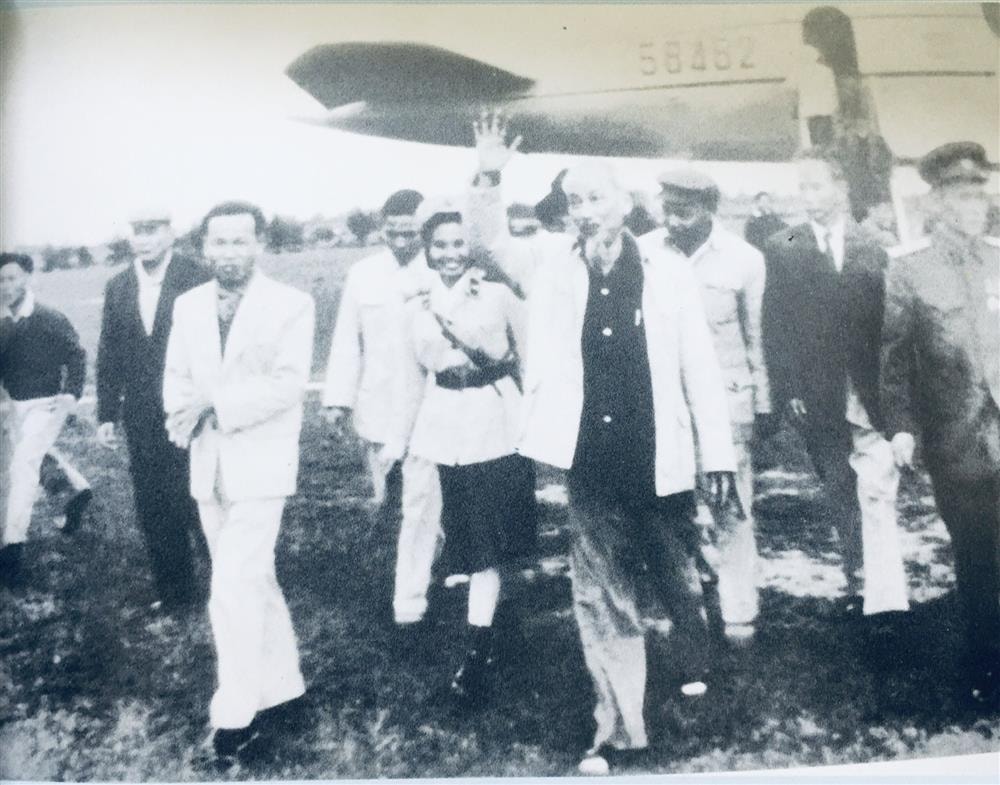
On December 8, 1961, comrade Vo Trong An and comrade Vo Thuc Dong (Provincial Party Secretary) personally went to Vinh airport to welcome Uncle Ho to his hometown for the second time. Comrade Vo Trong An, as a member of the Standing Committee and Vice Chairman of the Provincial People's Committee in charge of internal affairs, made an important contribution to ensuring the safety of this important event.
At the end of 1963, he was allowed to retire by the Party and the State. During his retirement years in his hometown of Hung Dong, he still maintained the good qualities of a communist party member, still being clear-headed and alert, contributing many important ideas to the province, the city and his commune. At the same time, he often encouraged his children and grandchildren to promote the traditions of his hometown and family, following the example of previous generations to fulfill the sacred duty of the Party and the nation. In 1997, comrade Vo Trong An passed away, to the regret of the Party Committee and the people of Nghe An.
Comrade Vo Trong An was awarded many noble awards by our Party and State such as: Second-class Independence Medal, Second-class Resistance War Medal against France, First-class Resistance War Medal against America, National Great Unity Medal, Vietnam-Soviet Friendship Medal, 60-year Party membership badge...
The life and revolutionary career of comrade Vo Trong An have gone through years of arduous struggle but are very proud. Tempered in the storms of revolution, arrested three times in imperialist prisons, many times on the border between life and death, but he always maintained the integrity of a true communist. The contributions of comrade Vo Trong An are the pride of his family, clan and hometown Nghe An, hometown Hung Nguyen with rich tradition of patriotism and revolution. He is a shining example for today's and future generations to learn and follow because:
"Despite the hardships of prison, my will is not shaken."
One revolutionary path, one loyal heart
White hair, innocent life
A joy - worry about the country."(5)
------
Note:
(1) Vo Trong An - a tall tree with great shade, Hoang Chinh, Thanh Nien Publishing House, 2010, p.68
(2) According to the Prison Records of Comrade Vo Trong An kept at the Nghe Tinh Soviet Museum
(3) Vo Trong An - a tall tree with great shade, Hoang Chinh, Thanh Nien Publishing House, 2010, pp. 68, 69
(4) According to History of Nghe An Provincial Party Committee (1930-1945) Volume 1, Nghe An Publishing House, 2019, p.138
(5) Excerpt from the poem "That Soldier" by Mr. Tran Van Dieu, a colleague during the time of the people's takeover of power in Hung Nguyen, given to comrade Vo Trong An on the occasion of his 90th birthday.
References:
- History of Nghe An Provincial Party Committee (1930-1945) Volume 1, Nghe An Publishing House, 2019
- History of Hung Nguyen District Party Committee, Volume 1 (1930-1945), 2000
- Nghe An communist role models Volume 3, National Political Publishing House, 2010
- The Red Suitcase, Vinh University Publishing House, 2020
- Vo Trong An, a tall tree with great shade, Thanh Nien Publishing House, 2010

